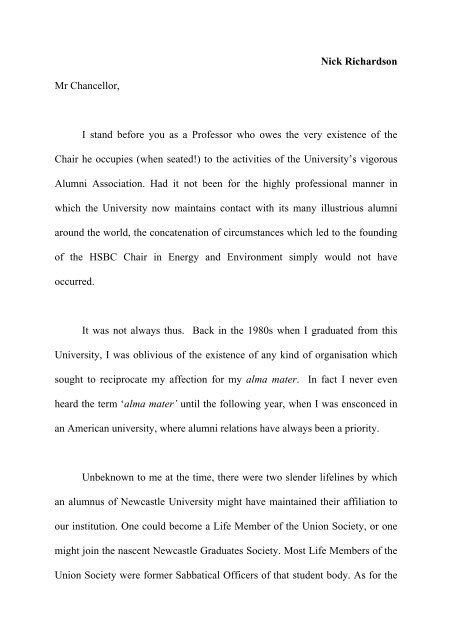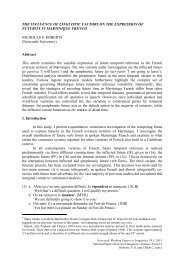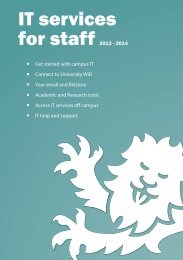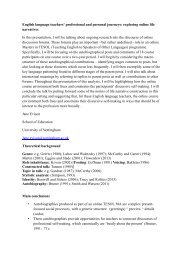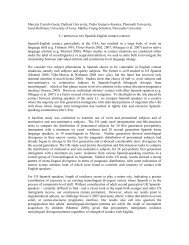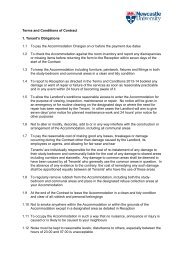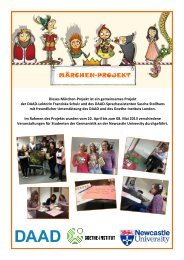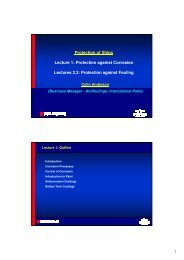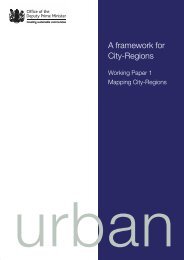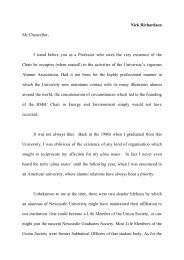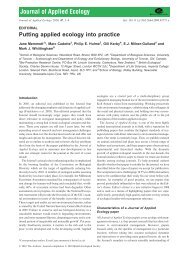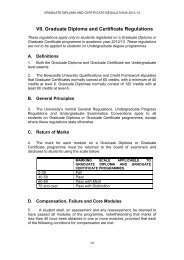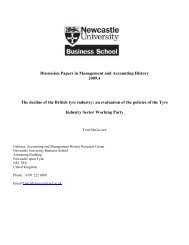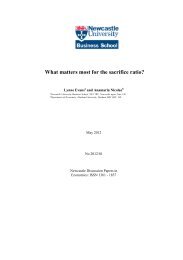Nick Richardson Mr Chancellor, I stand before you as a Professor ...
Nick Richardson Mr Chancellor, I stand before you as a Professor ...
Nick Richardson Mr Chancellor, I stand before you as a Professor ...
You also want an ePaper? Increase the reach of your titles
YUMPU automatically turns print PDFs into web optimized ePapers that Google loves.
<strong>Mr</strong> <strong>Chancellor</strong>,<br />
<strong>Nick</strong> <strong>Richardson</strong><br />
I <strong>stand</strong> <strong>before</strong> <strong>you</strong> <strong>as</strong> a <strong>Professor</strong> who owes the very existence of the<br />
Chair he occupies (when seated!) to the activities of the University’s vigorous<br />
Alumni Association. Had it not been for the highly professional manner in<br />
which the University now maintains contact with its many illustrious alumni<br />
around the world, the concatenation of circumstances which led to the founding<br />
of the HSBC Chair in Energy and Environment simply would not have<br />
occurred.<br />
It w<strong>as</strong> not always thus. Back in the 1980s when I graduated from this<br />
University, I w<strong>as</strong> oblivious of the existence of any kind of organisation which<br />
sought to reciprocate my affection for my alma mater. In fact I never even<br />
heard the term ‘alma mater’ until the following year, when I w<strong>as</strong> ensconced in<br />
an American university, where alumni relations have always been a priority.<br />
Unbeknown to me at the time, there were two slender lifelines by which<br />
an alumnus of Newc<strong>as</strong>tle University might have maintained their affiliation to<br />
our institution. One could become a Life Member of the Union Society, or one<br />
might join the n<strong>as</strong>cent Newc<strong>as</strong>tle Graduates Society. Most Life Members of the<br />
Union Society were former Sabbatical Officers of that student body. As for the
Graduates Society, it had come into existence at the time this University w<strong>as</strong><br />
created out of the former King’s College, essentially by re-labelling of the<br />
former “King’s Old Students Association”, or KOSA. “Old students” h<strong>as</strong> a<br />
different ring to it these days, when lifelong learning is incre<strong>as</strong>ingly becoming<br />
the norm. At the time that KOSA morphed into the Graduates’ Society, the “old<br />
students” were for the most part really rather spritely: most of them were<br />
locally-b<strong>as</strong>ed graduates who had performed admirably in student sports teams<br />
and wished to retain their fitness. In short, back when I graduated, alumni<br />
wishing to retain links to this University had two options, one best suited to<br />
former sabbatical officers of the Union Society, the other best suited to<br />
accomplished sportsmen. In c<strong>as</strong>e <strong>you</strong> haven’t already guessed, I belong to<br />
neither category.<br />
The prospects for alumni had been no different in 1977 when <strong>Nick</strong><br />
<strong>Richardson</strong> graduated in Zoology. Unlike the idle layabout who now <strong>stand</strong>s<br />
<strong>before</strong> <strong>you</strong>, however, <strong>Nick</strong> qualified e<strong>as</strong>ily for either of the two alumni lifelines:<br />
he had not only been a sabbatical officer in the Union Society, he had served <strong>as</strong><br />
President. As he’d also participated in student squ<strong>as</strong>h and boating societies, he<br />
w<strong>as</strong> also a natural for the Graduates Society – at le<strong>as</strong>t <strong>as</strong> long <strong>as</strong> he remained in<br />
the North E<strong>as</strong>t.
<strong>Nick</strong> w<strong>as</strong> brought up amidst the verdant charms of the Middle Thames<br />
Valley, where to all accounts he made a l<strong>as</strong>ting contribution to local culture by<br />
determinedly lowering the tone of the Henley Regatta. Unlike the ‘Freshers’ of<br />
today, who can hold us to a commitment to provide all first-years with<br />
University Accommodation, when <strong>Nick</strong> arrived in Newc<strong>as</strong>tle in the early 1970s<br />
he found himself billeted with the winner of the Whitley Bay Miserable<br />
Landlady of the Year Award, in a depressing bedsit with weeping windows. His<br />
spirits undampened, <strong>Nick</strong> proceeded to fall in love with Tyneside, Newc<strong>as</strong>tle<br />
and this University. He became a true ‘Born Again Geordie’, long <strong>before</strong> that<br />
happy phr<strong>as</strong>e w<strong>as</strong> ever coined.<br />
After completing his degree <strong>Nick</strong> initially stayed in Newc<strong>as</strong>tle, entering<br />
management training with Marks and Spencer. He could already see that<br />
something w<strong>as</strong> amiss in the way the University dealt with its alumni. Remaining<br />
very active <strong>as</strong> a Life Member of the Union Society, <strong>Nick</strong> first tried his best to<br />
expand uptake of that option. It proved difficult to expand membership beyond<br />
a dedicated circle of former Union Society officers. He also opened dialogue<br />
with the Graduates Society, patiently making the c<strong>as</strong>e to them for a more open,<br />
outward looking organisation catering for all graduates, rather than just the<br />
fortunate few capable sportsmen who remained in the local area.
It eventually dawned on all concerned that the problem did not simply lie<br />
with the attitude of the graduates: Why w<strong>as</strong>n’t the University interested in the<br />
hundreds of thousands of its graduates who were now scattered around the<br />
world? Even if it w<strong>as</strong>n’t willing to recognise that staying in touch with its<br />
alumni w<strong>as</strong> intrinsically worthwhile, could the University not at le<strong>as</strong>t see that<br />
our alumni represent a major potential <strong>as</strong>set?<br />
Suddenly the challenge facing <strong>Nick</strong> and his friends had become<br />
significantly greater: it amounted to nothing less than “Turning the University<br />
inside out” – getting the institution <strong>as</strong> a whole to replace its customary<br />
introspection with a new, outward-looking attitude, embracing its alumni and<br />
accepting their <strong>as</strong>sistance in improving its interactions with the wider world.<br />
<strong>Nick</strong> led the <strong>as</strong>sault on University introspection. It turned out to be a war<br />
of attrition: progress w<strong>as</strong> at best incremental in the early years. At times <strong>Nick</strong><br />
felt more hapless than the god-forsaken Sisyphus of Greek legend: At le<strong>as</strong>t the<br />
stone which Sisyphus rolled to the top of a mountain fell back down under its<br />
own weight; every time <strong>Nick</strong> reached the summit with his own stone it didn’t so<br />
much fall back under its own weight <strong>as</strong> begin to roll after a hefty kick from the<br />
hidden boot of campus cultural inertia. Colleagues still marvel at <strong>Nick</strong>’s<br />
resilience; at the innumerable occ<strong>as</strong>ions on which he dusted himself off and<br />
began to strive again.
Eventually, <strong>Nick</strong>, Dominic Pinto, Jack Jeffery, Mark Scrimshaw and<br />
other die-hard enthusi<strong>as</strong>ts for the cause of alumni engagement began to find<br />
powerful allies. The earliest of these w<strong>as</strong> former Registrar Roy Butler, who<br />
first seriously entertained their proposal for a dynamic Alumni Association. The<br />
University did in fact have a formal mechanism for involving graduates in the<br />
life of the institution: Convocation, a statutory body of which all alumni of<br />
King’s College and Newc<strong>as</strong>tle University are automatically members. However,<br />
the formal proceedings of Convocation take place only once a year: there w<strong>as</strong><br />
clearly a need to establish an alumni <strong>as</strong>sociation which could serve <strong>as</strong> the<br />
operational arm of Convocation year-round.<br />
By this time, during the economic downturn of the early 1980s, <strong>Nick</strong> and<br />
many of his allies had moved elsewhere for work. Nevertheless, they persevered<br />
in their enthusi<strong>as</strong>m, establishing a London Branch of the Newc<strong>as</strong>tle Graduates<br />
Society, which by then had subsumed the former Union Life Members.<br />
Momentum began to build for a reinvigoration of Convocation, with the<br />
enthusi<strong>as</strong>tic support of successive Vice-<strong>Chancellor</strong>s and Registrars. By the late<br />
1980s, regular meetings were being held at the request of VC Laurence Martin<br />
to make progress towards re-orienting both Convocation and the Graduates<br />
Society. Held on Saturday mornings, the principal officers of the University
would all be <strong>as</strong>sembled in business suits when <strong>Nick</strong> would breeze in from<br />
London, a flowing mane of curls surmounting a cherished rugby shirt.<br />
Despite being busier than ever in his day job, which over time h<strong>as</strong><br />
spanned the worlds of marketing, IT and consultancy, <strong>Nick</strong> h<strong>as</strong> never flagged in<br />
his energy and h<strong>as</strong> never been short of bright ide<strong>as</strong>. Working with the<br />
subsequent VC James Wright, and Registrar Derek Nicholson, the dream edged<br />
ever-closer to fulfilment. Eventually, around the turn of the Millennium, the<br />
dream w<strong>as</strong> finally realised, when the Alumni Association w<strong>as</strong> formally re-<br />
constituted, with elections for principal officers, an umbilical link to<br />
Convocation, and lively engagement in the work of the University’s<br />
Development and Alumni Relations Office.<br />
It would be remiss of me to close without mentioning another major<br />
success to which <strong>Nick</strong> h<strong>as</strong> greatly contributed. Given that he hails from Henley,<br />
it is natural that <strong>Nick</strong> h<strong>as</strong> a keen interest in rowing. In the City of Newc<strong>as</strong>tle, he<br />
found an adoptive home which can bo<strong>as</strong>t an historic rowing heritage second to<br />
none, in the achievements of ‘Hadaway Harry’ Cl<strong>as</strong>per, ‘Honest Bob’<br />
Chambers, James Renforth and other world champion oarsman of keel rowing<br />
stock. These oarsmen were the Alan Shearers of their age: Tyneside sporting<br />
heroes of immense popularity. Yet that golden age w<strong>as</strong> more than a century p<strong>as</strong>t<br />
when <strong>Nick</strong> first came to Tyneside. As a student, <strong>Nick</strong> gave of his best at the oar
in the cause of restoring lustre to the rowing tradition of Newc<strong>as</strong>tle. More<br />
recently, he became one of three major benefactors of rowing in the University,<br />
whose generosity enabled the recruitment of Angelo Savarino, who previously<br />
coached the Italian Olympic rowing squad. The result is a Newc<strong>as</strong>tle University<br />
rowing team literally wreathed in success, improving its annual scoring rate by<br />
a factor of almost thirty, winning 6 gold medals, 5 silver and 5 bronze in this<br />
year’s regatt<strong>as</strong> of the British Universities Sporting Association, and supplying<br />
the two-man team who won Great Britain the World Universities Rowing<br />
Championship in Lithuania in August.<br />
<strong>Mr</strong> <strong>Chancellor</strong>, <strong>Nick</strong> <strong>Richardson</strong> h<strong>as</strong> long rowed against the stream,<br />
firmly persisting in the cause of bringing our great University to its senses over<br />
the way it relates to its family of alumni throughout the world. In view of his<br />
extraordinary efforts and accomplishments, I now <strong>as</strong>k <strong>you</strong> to bestow upon him<br />
an Honorary Fellowship of Newc<strong>as</strong>tle University.<br />
Citation by <strong>Professor</strong> Paul Younger


